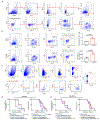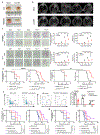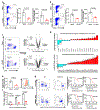Epigenetic therapy inhibits metastases by disrupting premetastatic niches
- PMID: 32103175
- PMCID: PMC8765085
- DOI: 10.1038/s41586-020-2054-x
Epigenetic therapy inhibits metastases by disrupting premetastatic niches
Abstract
Cancer recurrence after surgery remains an unresolved clinical problem1-3. Myeloid cells derived from bone marrow contribute to the formation of the premetastatic microenvironment, which is required for disseminating tumour cells to engraft distant sites4-6. There are currently no effective interventions that prevent the formation of the premetastatic microenvironment6,7. Here we show that, after surgical removal of primary lung, breast and oesophageal cancers, low-dose adjuvant epigenetic therapy disrupts the premetastatic microenvironment and inhibits both the formation and growth of lung metastases through its selective effect on myeloid-derived suppressor cells (MDSCs). In mouse models of pulmonary metastases, MDSCs are key factors in the formation of the premetastatic microenvironment after resection of primary tumours. Adjuvant epigenetic therapy that uses low-dose DNA methyltransferase and histone deacetylase inhibitors, 5-azacytidine and entinostat, disrupts the premetastatic niche by inhibiting the trafficking of MDSCs through the downregulation of CCR2 and CXCR2, and by promoting MDSC differentiation into a more-interstitial macrophage-like phenotype. A decreased accumulation of MDSCs in the premetastatic lung produces longer periods of disease-free survival and increased overall survival, compared with chemotherapy. Our data demonstrate that, even after removal of the primary tumour, MDSCs contribute to the development of premetastatic niches and settlement of residual tumour cells. A combination of low-dose adjuvant epigenetic modifiers that disrupts this premetastatic microenvironment and inhibits metastases may permit an adjuvant approach to cancer therapy.
Figures














Comment in
-
Epigenetic Therapy Can Suppress Premetastatic Changes in the Lung.Cancer Discov. 2020 May;10(5):OF10. doi: 10.1158/2159-8290.CD-RW2020-036. Epub 2020 Mar 6. Cancer Discov. 2020. PMID: 32144095
-
Tweaking the DNA of myeloid cells curbs cancer spread.Nature. 2020 Mar;579(7798):196-197. doi: 10.1038/d41586-020-00481-y. Nature. 2020. PMID: 32152601 No abstract available.
References
-
- Arriagada R et al. Long-term results of the international adjuvant lung cancer trial evaluating adjuvant Cisplatin-based chemotherapy in resected lung cancer. J. Clin. Oncol. 28, 35–42 (2010). - PubMed
-
- Bonapace L et al. Cessation of CCL2 inhibition accelerates breast cancer metastasis by promoting angiogenesis. Nature 515, 130–133 (2014). - PubMed
MeSH terms
Substances
Grants and funding
LinkOut - more resources
Full Text Sources
Medical
Molecular Biology Databases

